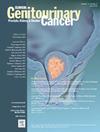Docetaxel Versus Androgen-Receptor Signaling Inhibitors (ARSI) as Second-Line Therapy After Failure of First-Line Alternative ARSI for the Elderly ≥ 75 Years Old With Metastatic Castration-Resistant Prostate Cancer (mCRPC): A SPARTACUSS—Meet-URO 26 Real-World Study
IF 2.3
3区 医学
Q3 ONCOLOGY
引用次数: 0
Abstract
Background
Androgen receptor signalling inhibitors (ARSIs) abiraterone acetate (AA) enzalutamide (Enza), are currently the standard first-line (L1) treatments for metastatic castration-resistant prostate cancer (mCRPC), and docetaxel (D) is reserved as second-line (L2) after ARSI failure. Nonetheless, D use in men ≥ 75 years old is restricted owing to treatment toxicities and patient comorbidities, and a L2 alternative ARSI is frequently used. We aimed to evaluate real-life survival and toxicity outcomes of these elderly patients after failure of L1 ARSI treatment.
Material and Methods
We retrospectively evaluated efficacy and safety in a real-world international cohort of consecutive patients ≥ 75 years old when starting L1 ARSI for mCRPC according to the choice of L2 treatment (D versus alternative ARSI).
Results
Of the 122 identified patients, 57 (46.7%) had received L2 ARSI and 65 (53.3%) L2 D. No difference was found in the L1 overall survival (OS) for the ARSI and D groups (32.8 vs. 30.0 months, respectively; Hazard ratio [HR] = 1.22; 95% CI, 0.77-1.95; P = .40) or in the L2 OS (18.5 vs. 17.8 months, respectively; HR = 1.09; 95% CI, 0.69-1.74; P = .71). No difference was observed for rPFS from L2 (P = .12), although a trend was observed for a numerically improved rPFS on D.
Conclusion
Within the limitations of a retrospective design and small population, our study suggests that D or ARSI after failure of L1 alternative ARSI are clinically comparable L2 options for elderly patients with mCRPC.
多西他赛与雄激素受体信号转导抑制剂 (ARSI) 作为二线疗法,用于治疗≥ 75 岁的转移性阉割抗性前列腺癌 (mCRPC) 老年患者:SPARTACUSS-Meet-URO 26 真实世界研究》。
背景:雄激素受体信号抑制剂(ARSIs)醋酸阿比特龙(AA)恩扎鲁胺(Enza)是目前治疗转移性去势抵抗性前列腺癌(mCRPC)的标准一线(L1)疗法,多西他赛(D)则是ARSI失败后的二线(L2)疗法。然而,由于治疗毒性和患者的合并症,多西他赛在年龄≥ 75 岁男性中的使用受到限制,因此经常使用 ARSI 作为二线替代疗法。我们的目的是评估 L1 ARSI 治疗失败后这些老年患者的实际生存和毒性结果:我们回顾性评估了一个真实世界的国际队列中年龄≥75岁的连续患者在开始L1 ARSI治疗mCRPC时根据L2治疗选择(D与替代ARSI)的疗效和安全性:ARSI组和D组的L1总生存期(OS)(分别为32.8个月和30.0个月;危险比[HR] = 1.22;95% CI,0.77-1.95;P = .40)或L2 OS(分别为18.5个月和17.8个月;HR = 1.09;95% CI,0.69-1.74;P = .71)均无差异。从L2开始的rPFS没有观察到差异(P = .12),但观察到D的rPFS在数值上有改善的趋势:结论:在回顾性设计和小规模人群的限制下,我们的研究表明,对于老年 mCRPC 患者来说,在 L1 替代 ARSI 失败后,D 或 ARSI 是临床上具有可比性的 L2 选项。
本文章由计算机程序翻译,如有差异,请以英文原文为准。
求助全文
约1分钟内获得全文
求助全文
来源期刊

Clinical genitourinary cancer
医学-泌尿学与肾脏学
CiteScore
5.20
自引率
6.20%
发文量
201
审稿时长
54 days
期刊介绍:
Clinical Genitourinary Cancer is a peer-reviewed journal that publishes original articles describing various aspects of clinical and translational research in genitourinary cancers. Clinical Genitourinary Cancer is devoted to articles on detection, diagnosis, prevention, and treatment of genitourinary cancers. The main emphasis is on recent scientific developments in all areas related to genitourinary malignancies. Specific areas of interest include clinical research and mechanistic approaches; drug sensitivity and resistance; gene and antisense therapy; pathology, markers, and prognostic indicators; chemoprevention strategies; multimodality therapy; and integration of various approaches.
 求助内容:
求助内容: 应助结果提醒方式:
应助结果提醒方式:


